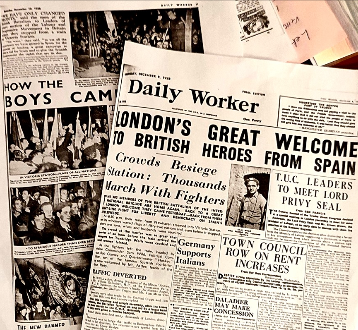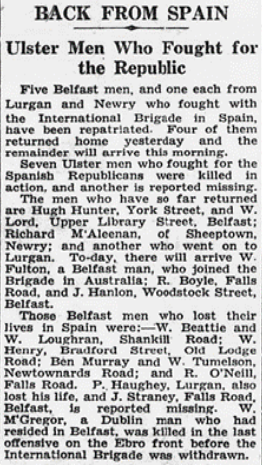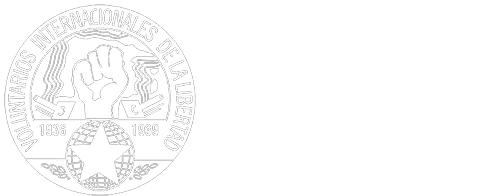International Brigade Memorial Trust
From 5 to 12 December, events will be held around the country to commemorate the 85th anniversary of the return of the British Battalion from Spain in 1938. In this article Lynda Walker describes what happened from an Ireland perspective…
7 December marks the 85th anniversary of the return of the volunteers from Spain in 1938, when 304 members of the British Battalion arrived in London.
From there the International Brigaders travelled home to various parts of Britain and Ireland. The welcome home that the they received in London was amazing and it was captured on film.
IBMT Film Co-ordinator Marshall Mateer writes: ‘[A] film of the landing at Newhaven and the arrival at Victoria Station was made by Ivor Montagu of the Progressive Film Institute, filmed by volunteers from the Cinematographic Union with processing provided by the industry and supported by British Gaumont.’
The footage includes film taken by Montagu’s crew in Spain, which shows volunteers in the summer of 1938. In total there are seven minutes of black and white film without sound. It is one of the few films of the British Battalion and is now in the British Film Institute’s archives.
On 8 December 1938 the Daily Worker reported: ‘Members of the British Battalion of the International Brigade are home again. Back to a great London welcome they came yesterday – back from their front-line fight for liberty and democracy on Spain’s battlefields.

‘At 6.30 p.m. their train from Newhaven steamed into Victoria Station. Its windows waved flags of fifty-two nations and, even before it stopped, mothers and sons, wives and husbands were reunited.’
An estimated 20,000 turned out to welcomed the Brigade. ‘As the fighters left the train, headed by Battalion Commander Sam Wild, Political Commissar Bob Cooney and Quartermaster “Hookey” Walker, son of the famous Scottish footballer, they were welcomed by Mr Attlee, leader of the Labour Party.’
The Daily Worker reported that they were welcomed by Will Lawther, Acting President of the Miners’ Union, William Gallacher, West Fife MP of the Communist Party (CPGB), Richard Squance, the train drivers’ union leader, Sir Ralph Norman Angell and Sir Stafford Cripps, both prominent Labour anti-fascists, and veteran trade unionist Tom Mann.
On 10 December the Daily Worker headline read: ‘We have only changed our fronts’. ‘We want,’ the returning Brigaders said, ‘to use all the experience we have gained in Spain for the purpose of leading a great campaign to aid Spain and to give the Spanish government the rights that are due. We want to help in overthrowing the British government which has done nothing but hinder the Spanish government and bring distress and unhappiness to the Spanish people. We need everyone to help us.’
The page carried seven photos of the welcome home given to the Brigaders and reported: ‘The returned men have come back with an objective in view as urgent and important as the task they undertook in Spain.’ That object is best expressed in the farewell message sent to Dr Juan Negrín, Prime Minister of Spain, by the British Battalion just before its departure.
The message said: ‘We will never forget Spain or the Spanish people. We will work with all our might tor the triumph of the Republic. We realise our responsibility. We know that the foreign invasion of Spain is only made possible by the reactionary policy of Chamberlain. Chamberlain will go. All the efforts of our Battalion will be concentrated towards this end.’
In his book ‘The Connolly Column’, Dublin volunteer Michael O’Riordan recalls leaving France, on 7 December when “French dockers were lined up to present small bouquets of flowers to the Brigaders, and then on the boat to Newhaven and on the train to London’s Victoria Station, where a tumultuous welcome was given.’
He wrote: ‘The Irish went back to where they had come from, home to Ireland, Britain, the USA and other parts of the world.’
Before they went to Spain many had left Ireland for economic and political reasons. They had gone to Britain, Australia or the United States. Some of them joined the communist party of that country, like, for example, Johnny Power and Peter O’Connor, who were in England and joined the CPGB.
O’Riordan recounts how on the 10 December 1938 he and a small group of returning volunteers, Johnny Power, James O’Regan, Tom O’Brien, Mick Waters and Eugene Dowling, disembarked from Dun Laoghaire and boarded a train for Dublin’s Westland Road. They were greeted by friends and sympathisers, the members of the Irish Friends of the Spanish Republic.
On 13 December the Belfast Newsletter announced: ‘Back from Spain: Ulster Men Who Fought for the Republic’.
It reported: ‘Five Belfast men, and one each from Lurgan and Newry who fought with the International Brigade in Spain have been repatriated. Four of them returned home yesterday and the remainder will arrive this morning.’

They were men who were active in trade unions, in the Communist Party and Labour Party, and others who identified with the struggle for democracy in Spain. Most of the volunteers continued to be active in the labour and trade union movement wherever they settled.
The Newsletter also named some of those who were killed. They included William Beattie and W Loughran from the Shankill Road, W Henry from Bradford Street, Ben Murray and William Tumilson from Newtownards Road, R O’Neill, Falls Road, and, also from the Falls, Jim Straney, who was reported missing.
Linda Walker is a leading member of the Belfast-based International Brigade Commemoration Committee. A version of this article first appeared in the Irish Communist Party’s journal Unity on 11 November 2023.
